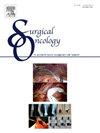Octogenarians with lower BMI have comparatively poor survival in potentially resectable pancreatic cancer: outcomes over 5-year follow-up
IF 2.4
4区 医学
Q3 ONCOLOGY
引用次数: 0
Abstract
Background
The indication and benefit of pancreatectomy for octogenarians with pancreatic cancer remains controversial. This study aims to evaluate prognostic factors in patients with pancreatic cancer after 5-year follow-up.
Methods
We retrospectively reviewed the 229 patients who underwent pancreatectomy at our hospital between 2005 and 2018 for potentially resectable pancreatic cancer. Of these, 216 patients were divided into three groups based on age: <70 years old (n = 97), 70–79 years old (n = 81), and ≥80 years old (n = 38).
Results
Seventy patients (32.4 %) achieved 5-year survival. Median survival time and five-year overall survival in each group were: 37.3 months and 37.1 % for patients <70 years old, 26.0 months and 30.9 % for those 70–79 years old, and 20.2 months and 23.7 % for those ≥80 years old. The patients who were ≥80 years old and had BMI <20 kg/m2 had a significantly poorer prognosis than those <80 years old and who had BMI ≥20 kg/m2 (P = 0.006). Independent prognostic factors were age ≥80 years and BMI <20 kg/m2, preoperative CA19-9 ≥ 500 IU/L, transfusion, tumor size ≥20 mm, positive lymph node, and non-completion of adjuvant therapy. Moreover, age ≥80 years, BMI <20 kg/m2, preoperative CA19-9, and severe complications were each associated with non-completion of adjuvant therapy.
Conclusions
Octogenarians with lower BMI, which might be attributed to lower completion rate of adjuvant therapy, had especially poorer prognosis.

BMI较低的八旬老人在潜在可切除的胰腺癌中生存率相对较低:5年随访结果
背景八十多岁胰腺癌患者行胰腺切除术的适应症和益处仍有争议。本研究旨在评估胰腺癌患者5年随访后的预后因素。方法回顾性分析2005年至2018年在我院行胰腺切除术的229例潜在可切除胰腺癌患者。其中,216例患者根据年龄分为三组:70岁(n = 97)、70 - 79岁(n = 81)和≥80岁(n = 38)。结果70例(32.4%)患者达到5年生存率。两组患者的中位生存期和5年总生存期分别为:70岁患者37.3个月和37.1%,70 - 79岁患者26.0个月和30.9%,≥80岁患者20.2个月和23.7%。年龄≥80岁且BMI≥20 kg/m2的患者预后明显差于年龄≥80岁且BMI≥20 kg/m2的患者(P = 0.006)。独立预后因素为:年龄≥80岁,BMI≥20 kg/m2,术前CA19-9≥500 IU/L,输血,肿瘤大小≥20 mm,淋巴结阳性,辅助治疗未完成。年龄≥80岁、BMI≥20 kg/m2、术前CA19-9、严重并发症均与未完成辅助治疗相关。结论老年患者BMI越低,其预后越差,可能与辅助治疗完成率越低有关。
本文章由计算机程序翻译,如有差异,请以英文原文为准。
求助全文
约1分钟内获得全文
求助全文
来源期刊

Surgical Oncology-Oxford
医学-外科
CiteScore
4.50
自引率
0.00%
发文量
169
审稿时长
38 days
期刊介绍:
Surgical Oncology is a peer reviewed journal publishing review articles that contribute to the advancement of knowledge in surgical oncology and related fields of interest. Articles represent a spectrum of current technology in oncology research as well as those concerning clinical trials, surgical technique, methods of investigation and patient evaluation. Surgical Oncology publishes comprehensive Reviews that examine individual topics in considerable detail, in addition to editorials and commentaries which focus on selected papers. The journal also publishes special issues which explore topics of interest to surgical oncologists in great detail - outlining recent advancements and providing readers with the most up to date information.
 求助内容:
求助内容: 应助结果提醒方式:
应助结果提醒方式:


